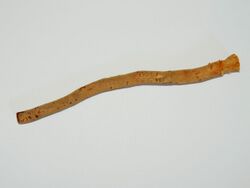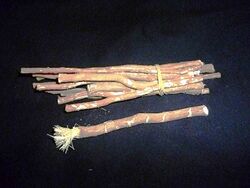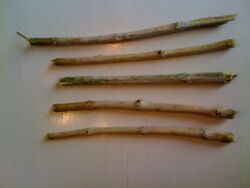Miswak
Topic: Engineering
 From HandWiki - Reading time: 9 min
From HandWiki - Reading time: 9 min
The miswak is a teeth-cleaning twig made from the Salvadora persica tree. The miswak's properties have been described as follows: "Apart from their antibacterial activity which may help control the formation and activity of dental plaque, they can be used effectively as a natural toothbrush for teeth cleaning. Such sticks are effective, inexpensive, common, available, and contain many medical properties".[1]
The miswak or siwak is predominantly used in Muslim-inhabited areas. It is commonly used in the Arabian Peninsula, the Horn of Africa, North Africa, parts of the Sahel, the Indian subcontinent, and Central Asia.
The oral hygiene practice using herbal sticks exists in many parts of the world since ancient time: ancient India, ancient Greece (mentioned by Alciphron, ancient Rome, ancient Israel (mentioned in Talmud), Eastern Asia (mentioned in the Gospel of Buddhism),[2] etc.
Denominations
The sticks made of Salvadora persica tree are called miswak, siwak or arak in Arabic,[3] koyoji in Japanese, qesam or qesem in Hebrew,[3] qisa in Aramaic, mastic in Latin,[4] sotio or sothiou in Wolof of Senegal,[5][6] siwahewal (plural siwakejé) in Northern Nigeria Fulani.[7]
The term miswak should not be confused with the same term used in Maghreb[8] which in Maghrebi Arabic also refers to a completely different instrument made from walnut wood (Juglans regia L., common walnut), both a toothbrush and a toothpick,[8] also used to clean teeth and gums in Morocco,[3] Algeria,[9][10] Tunisia,[11] and Libya.[12]
History
As far back as antiquity, people began to practice oral hygiene by using fibrous chewable sticks, such as siwak, as toothbrushes. The stick contains cleaners, disinfectants and even fluorides. It is recommended in the collection of medical knowledge of the Ancient Indian surgeon (ca. 500 BC) Sushruta, known as a pioneer of anesthesia, which he practiced in particular with Indian hemp.[13] Siwak is also mentioned in the ancient Indian book of the Laws of Manu (Sanskrit: मनुस्मृति, manusmṛti) around the Christian era.[citation needed] In the Islamic world, Muhammad is said to have used it regularly, according to later Hadîth literature.[14]
Science
The World Health Organization (WHO) recommended the use of the miswak in 1986, but in 2000, an international consensus report on oral hygiene concluded that further research was needed to document the effect of the miswak.[15] Some of this further research has been done on a population of 203, and concluded, "that the periodontal status of miswak users in this Sudanese population is better than that of toothbrush users".[16] Yet another comparative study conducted on a sampling of 480 Saudi Arabian adults found that "the level of need for periodontal care in the sample chosen is low when compared with the findings of similar studies undertaken in other countries. The frequent use of the 'Miswak' was associated with a lower need for treatment".[17]
Miswak extract vs. oral disinfectants
Studies indicate that Salvadora persica extract exhibits low antimicrobial activity compared to other oral disinfectants and anti-plaque agents like triclosan and chlorhexidine gluconate.[18]
Mouthrinses containing chlorhexidine was with maximum antibacterial activity, while cetylpyridinium chloride mouthrinses were with moderate and miswak extract was with low antibacterial activity.[18]
However, the benefits of triclosan were discounted by the United States Food and Drug Administration in 2016 and its safety is uncertain as a hygiene product ingredient.[19] Chlorhexidine gluconate was also linked to serious allergic reactions, albeit rarely.[20]
Chemical composition
Salvadorine and benzylisothiocyanate appear to be responsible for the antibacterial activity of Miswak. The plant also contains insoluble fluoride in high concentration, calcium, salicylic acid, and some antioxidants of unclear function.[21]
Religious prescriptions


The use of the miswak is frequently advocated in the hadith (the traditions relating to the life of Prophet Muhammad). Situations where the miswak is recommended to be used include before or during wudu (ablution), before going to the mosque, before entering one's house, before and after going on a journey, on Fridays,[22] before sleeping and after waking up, when experiencing hunger or thirst and before entering any good gathering.
Hadiths concerning the miswak
It is often mentioned that the Islamic prophet Muhammad recommended the miswak's use.[23] He is quoted in various hadith extolling its virtues:[24][25]
Were it not that I might over-burden the Believers I would have ordered them to use Siwak (Miswak) at the time of every Prayer.[26]
Four things are from among the practices of the Prophets: Circumcision, Perfume, Miswak, and Marriage.[26]
Make a regular practice of Miswak for verily it is the purification for the mouth and a means of the pleasure of the Lord.[26]
Use the Miswaak, for verily, it purifies the mouth, and it is a Pleasure for the Lord. Jib-ra-eel (A.S.) exhorted me so much to use the Miswaak that I feared that its use would be decreed obligatory upon me and upon my Ummah. If I did not fear imposing hardship on my Ummah I would have made its use obligatory upon my people. Verily, I use the Miswaak so much that I fear the front part of my mouth being peeled (by constant and abundant brushing with the Miswaak)[27]
Alternative forms

Modern uses of arāk wood in oral hygiene expands beyond miswak itself. Extracts containing its active components have been added to mouthwash and toothpaste.[28] There is also a German patent for similar formulations for domesticated animals.[29]
References
- ↑ "The effect of the extract of the miswak (chewing sticks) used in Jordan and the Middle East on oral bacteria.". International Dental Journal 45 (3): 218–222. 1995. PMID 7558361.
- ↑ "A Review on the Pharmagnostic Evaluation of Meswak, Salvadora Persica | Bioscience Biotechnology Research Communications". https://bbrc.in/a-review-on-the-pharmagnostic-evaluation-of-meswak-salvadora-persica/.
- ↑ 3.0 3.1 3.2 Samer Lababidi. Salvadora Persica L : intérêt en hygiène bucco-dentaire. Sciences du Vivant [q-bio]. 2019. ffdumas-02130212ff
- ↑ Haque, Mohammad M.; Alsareii, Saeed A. (May 30, 2015). "A review of the therapeutic effects of using miswak (Salvadora Persica) on oral health". Saudi Medical Journal 36 (5): 530–543. doi:10.15537/smj.2015.5.10785. PMID 25935172.
- ↑ Grappin G. et Kerharo J. — Note sur les Sotio (frotte-dents) vendus sur les marchés Dakarois. Commun. 6e journées Med. Dakar, 1969.
- ↑ Muanya, Ernestine (December 19, 2022). "Africa : Tales from the Motherland". Ernestine Muanya. https://books.google.com/books?id=weiiEAAAQBAJ&dq=%22sothiou%22+%22miswak%22&pg=PA49.
- ↑ Portères, Roland (July 30, 1974). "Les baguettes végétales mâchées servant de frotte-dents (fin)". Journal d'agriculture traditionnelle et de botanique appliquée 21 (4): 111–150. doi:10.3406/jatba.1974.3157. https://www.persee.fr/doc/jatba_0021-7662_1974_num_21_4_3157.
- ↑ 8.0 8.1 Prevost, Virginie (July 30, 2008). L'aventure ibāḍite dans le Sud tunisien, VIIIe-XIIIe siècle: effervescene d'une région méconnue. Heikki Palva. ISBN 978-951-41-1019-1. https://books.google.com/books?id=qK8jAQAAIAAJ&q=%22miswak%22+%22maghreb%22+%22noyer%22.
- ↑ 2020, Evaluation de l'activité fongicide et fongistatique des extraits de noyer commun (Juglans regia) (PDF) · GUERIANE, Ilhem; REZIG, Sara; SAIDI, Chahinez, Depot Institutionnel de l'UMBB/Université M'Hamed BOUGARA de Boumerdès
- ↑ Maiza Khadra. PHARMACOPEE TRADITIONNELLE SAHARIENNE SAHARA ALGERIEN. Botanique. université Ben youcef Ben khedda, Alger, 2008. Français. ffNNT : ff. fftel-04105712ff
- ↑ L'aventure ibāḍite dans le Sud tunisien, VIIIe-XIIIe siècle effervescene d'une région méconnue · Volume 350, Virginie Prevost, 2008
- ↑ Khaled Abdalla. Le potentiel de développement durable du tourisme de santé en Libye : son influence sur l’attraction des touristes européens : étude en géographie touristique. Géographie. Université Bourgogne Franche-Comté, 2017. Français. ffNNT : 2017UBFCH010ff. fftel-01754051ff
- ↑ D. P. Agrawal. "Susruta: The Great Surgeon of Yore" (in en). http://www.infinityfoundation.com/mandala/t_es/t_es_agraw_susruta.htm. Retrieved 2015-04-18.
- ↑ "Center for Muslim-Jewish Engagement al-Buchārī (Sahih Bukhari)" (in en) (English translation). http://www.usc.edu/org/cmje/religious-texts/hadith/bukhari/. Retrieved 2015-04-18.
- ↑ "Darout, Ismail Abbas, Undersøkelse av en aktuell eldgammel munnrengjøringsmetode, dr.odont., disputas: 23.06.2003" (in Norwegian). http://www.uib.no/info/dr_grad/2003/darout.htm.
- ↑ Darout, Ismail A.; Albandar, Jasim M.; Skaug, Nils (January 2000). "Periodontal status of adult Sudanese habitual users of miswak chewing sticks or toothbrushes". Acta Odontologica Scandinavica 58 (1): 25–30. doi:10.1080/000163500429398. PMID 10809396.
- ↑ "Periodontal treatment needs among Saudi Arabian adults and their relationship to the use of the Miswak.". Community Dental Health 8 (4): 323–328. 2003. ISSN 0265-539X. PMID 1790476.
- ↑ 18.0 18.1 Almas, K; Skaug, N; Ahmad, I. (February 2005). "An in vitro antimicrobial comparison of miswak extract with commercially available non-alcohol mouthrinses.". International Journal of Dental Hygiene 3 (1): 18–24. doi:10.1111/j.1601-5037.2004.00111.x. PMID 16451373.
- ↑ Commissioner, Office of the. "Consumer Updates - 5 Things to Know About Triclosan" (in en). https://www.fda.gov/ForConsumers/ConsumerUpdates/ucm205999.htm.
- ↑ Commissioner, Office of the. "Safety Alerts for Human Medical Products - Chlorhexidine Gluconate: Drug Safety Communication - Rare But Serious Allergic Reactions" (in en). https://www.fda.gov/safety/medwatch/safetyinformation/safetyalertsforhumanmedicalproducts/ucm539575.htm.
- ↑ Chaurasia, A; Patil, R; Nagar, A (May 2013). "Miswak in oral cavity - An update.". Journal of Oral Biology and Craniofacial Research 3 (2): 98–101. doi:10.1016/j.jobcr.2012.09.004. PMID 25737893.
- ↑ "الرئيسة - الحديث - موقع الإسلام". http://hadith.al-islam.com/Display/hier.asp?Doc=0&n=1417.
- ↑ "Excellence of Miswak in Hadiths" at ziaetaiba.com.
- ↑ "Miswak" at sunnah.com.
- ↑ "Siwak" at searchtruth.com.
- ↑ 26.0 26.1 26.2 IslamKotob, Muslims and "Science", (Islamic Books), p.30.
- ↑ Farouk, Muhammed. "Miswak/Sewak". http://www.islam.tc/Miswaak/.
- ↑ Halawany, HS (April 2012). "A review on miswak (Salvadora persica) and its effect on various aspects of oral health.". The Saudi Dental Journal 24 (2): 63–9. doi:10.1016/j.sdentj.2011.12.004. PMID 23960531.
- ↑ Bruins, Hans-Kervin; Mehlhorn, Heinz Prof Dr; Mennemann, Horst; Berendsen, Paul; Schmidt, Jürgen Dr (8 July 2004). "Oral and dental care product for domestic animals, especially dogs, cats and horses, comprises comminuted, pulverized or micronized wood" (in en). https://patents.google.com/patent/DE10258659A1.
Further reading
- Islamic Research on Miswak (Dr. Al Sahli)
- Khan, Tehmeena, Toothbrush (Miswak), in Muhammad in History, Thought, and Culture: An Encyclopedia of the Prophet of God (2 vols.), Edited by C. Fitzpatrick and A. Walker, Santa Barbara, ABC-CLIO, 2014.
External links
 |
 KSF
KSF